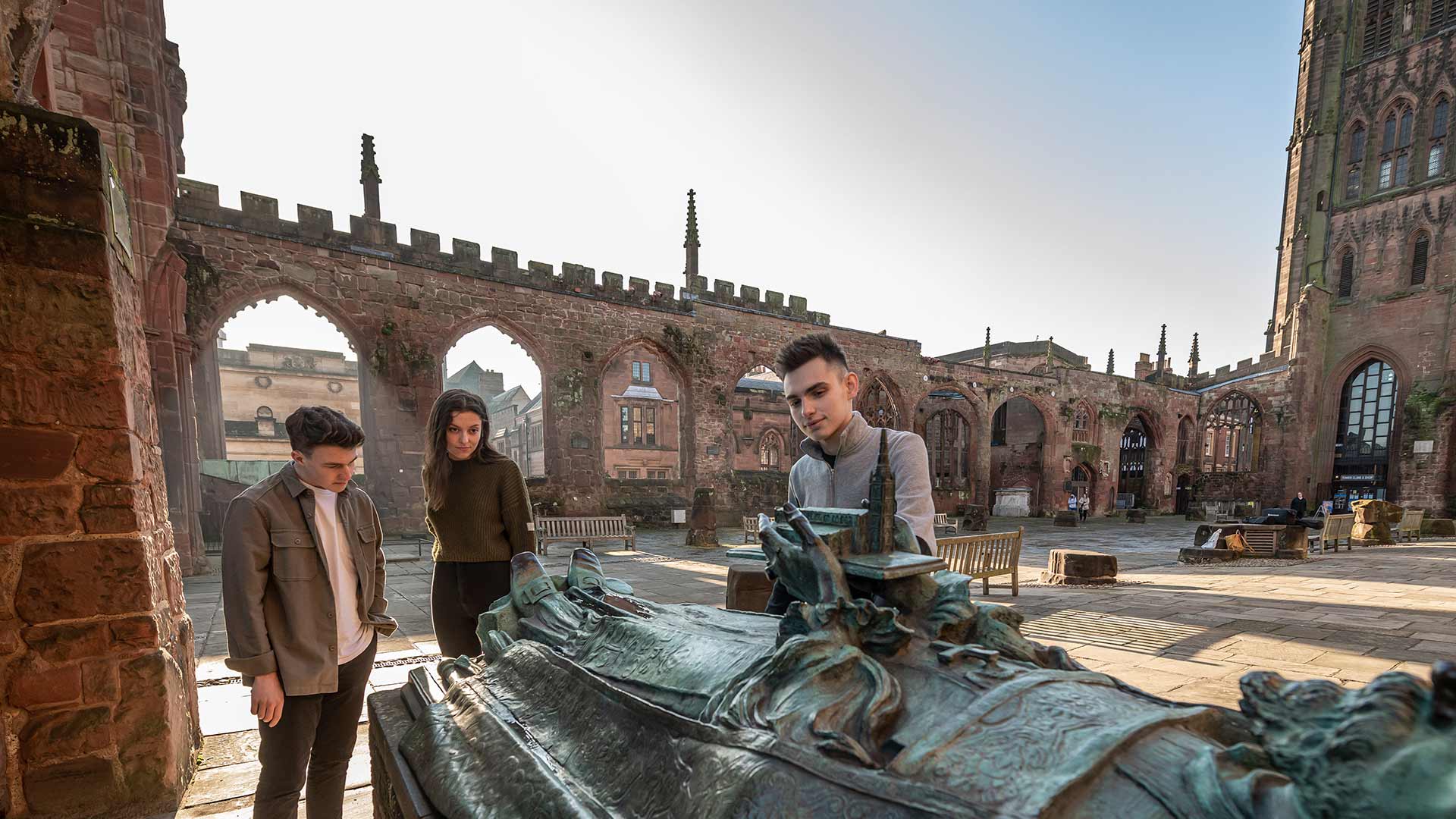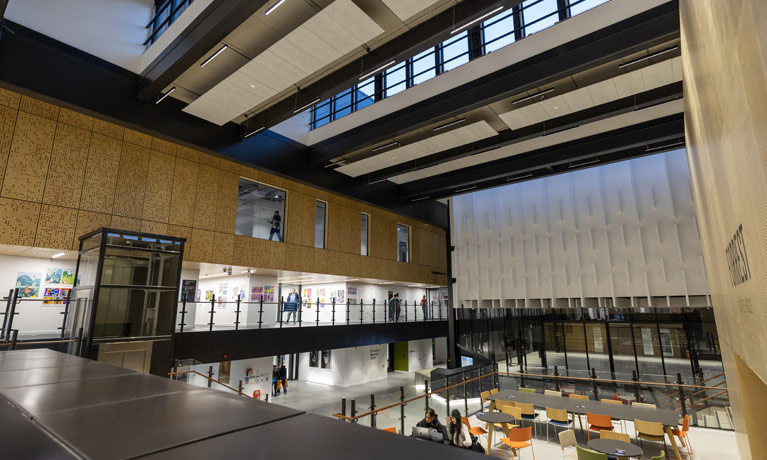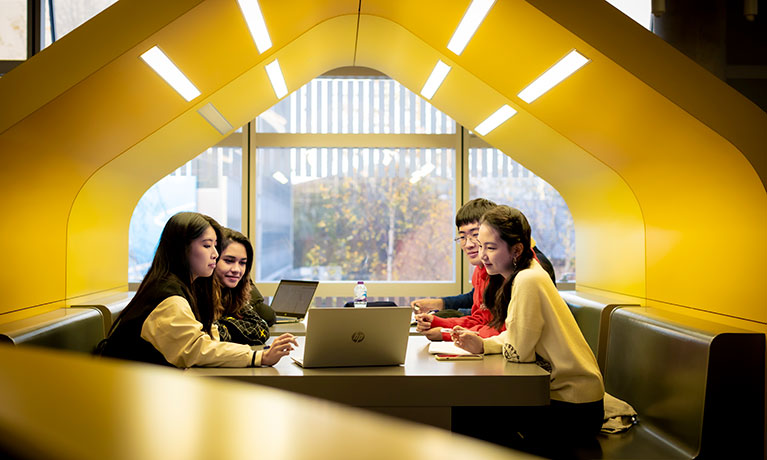Search
History MA
Study level: Postgraduate
Our History MA is an exciting opportunity to study global history through local lenses and explore the relationship between war and the media, the history of environmentalism, indigenous voices, and gender history.
Course features
Year of entry
2024-25
Location
Coventry University (Coventry)
Study mode
Full-time
Part-time
Duration
1 year full-time
2 years part-time
16-24 months (with professional experience)
Course code
AHT059
Start date
September 2024
January 2025
May 2025
Course overview
Through innovative, digital and real-world assessments, the History MA prepares you for your professional future by equipping you with transferable and essential analytical, research and management skills.
The History MA builds on your existing knowledge and experience by offering a research-led and student-inspired postgraduate course.
- The course aims to develop your research and professional capabilities, equipping you with the essential skills to thrive in an increasingly global and mediatised world.
- This interdisciplinary course investigates essential questions about the nature and ownership of history and explores important debates about the role of the media and social change in modern history.
- You will have the option to apply for a ‘professional experience’ opportunity2 designed to further develop your skills and knowledge with the aim of maximising your employability prospects. See the 'What you'll study' section for more information.
Joint Top Modern University for Career Prospects
Guardian University Guide 2021 and 20225 QS Stars for Teaching and Facilities
QS Stars University RatingsTop 5 UK Student City in England (Coventry)
QS Best Student Cities Index 2024Why you should study this course
The course has been designed to use the past to prepare you for the future. Through a range of historical specialisms, taught using a diversity of teaching methods and innovative forms of assessment (including blogs, emulations and video presentations), this MA prepares you for the graduate job market.
- You will have the opportunity to study a wide selection of issues, including the history of wartime media, environmental and indigenous history, and the history of gender/social change.
- The close relationship between the MA course and the research expertise of the historians in the school gives you opportunities to learn from specialists and to strengthen your research skills.
- The interdisciplinary and innovative approach of the course to teaching and assessment provides transferable skills – skills that are valued by employers across the public and private sectors.
Collaborations with other organisations
Confucius Institute
The School of Humanities is home to the Confucius Institute. This is a collaboration created with Jiangxi University of Finance and Economics, which aims to promote an understanding of the Chinese language and culture.
Coventry Degree Show 2023
The Coventry Degree Show is an annual event to celebrate and showcase our graduating students’ work.
Explore the work of our talented students
What you'll study
The course will examine questions about the creation and preservation of history, the potential ramifications of who controls the past, the impact of the media on framing and understanding historical events across the world, the ways in which our understanding of the past and the present is often a result of mediatisation. and the role that historical debates and events play in current discussions surrounding race and gender.
The themes and topics at the heart of the MA include environmental and indigenous history, the history of the wartime media, and the history of gender and social change. It also draws on the interdisciplinary expertise of the school’s International Relations and Politics teams, empowering you to gain a better and more comprehensive insight into the historical development of the modern period.
With professional experience option
The professional experience opportunity2 enables you the opportunity to apply for optional professional experience in semester 1, which, upon successfully securing an opportunity, will extend the duration of your master’s to either 16, 20 or 24 months. The professional experience provides an opportunity for you to develop expertise and experience in your chosen field with the aim of enhancing your employability.
Please note that the optional professional experience modules incur an additional tuition fee, which for 1 semester of professional experience is £1,333.33, for 2 semesters of professional experience is £2,666.67, and for 3 semesters of professional experience is £4,000.
Professional experience may also be subject to additional costs, visa requirements being met, subject to availability and/or competitive application. Professional experience opportunities are not guaranteed but you will benefit from the support of our Talent Team in trying to find and secure an opportunity. Find out more about the professional experience option.
We regularly review our course content, to make it relevant and current for the benefit of our students. For these reasons, course modules may be updated.
How you'll learn
During the first two semesters you will study seven mandatory modules based around the key themes of the MA. In the final semester you will complete a 15,000-word dissertation based on a research topic you choose. Modules are typically 15 credit modules except for 'War, Media and Society in the 20th Century' (which is 30 credits and includes an induction to the MA), 'Creative Futures and Social Change' (which is 10 credits) and the dissertation module which is 50 credits.
During semester one, you can apply for the extended route, which offers an opportunity to reflect upon and gain professional experience through three semesters of internship or placement with a host of different organisations.2 Please see the module section for further information.
This course can be offered on a part-time basis. Whilst we would like to give you all the information about our part-time offering here, it is tailored for each course each year depending on the number of part-time applicants. Therefore, the part-time teaching arrangements vary. Request further information about part-time study.
Teaching contact hours
The number of full-time contact hours may vary from semester to semester, however, on average, it is likely to be around 12-15 contact hours per week.
Additionally, you will be expected to undertake significant self-directed study of approximately 35 hours each week, depending on the demands of individual modules.
The contact hours may be made up of a combination of face-to-face teaching, individual and group tutorials.
As an innovative and enterprising institution, the university may seek to utilise emerging technologies within the student experience. For all courses (whether on-campus, blended, or distance learning), the university may deliver certain contact hours and assessments via online technologies and methods.
Since COVID-19, we have delivered our courses in a variety of forms, in line with public authority guidance, decisions, or orders and we will continue to adapt our delivery as appropriate. Whether on campus or online, our key priority is staff and student safety.
Assessment
This course will be assessed using a variety of methods which will vary depending on the module.
Assessment methods may include:
- Wartime Emulation
- Critical Reflections
- Critical Review
- Audio-Visual Biographic/Ethnographic Presentation
- Methodological Discussion
- Research Design
- Oral Presentation
- Heritage Activity Proposal and Reflection
- Video Presentation
- Strategy Report
- Blog
- Essays
- Final Project (15,000-word equivalent)
The Coventry University Group assessment strategy ensures that our courses are fairly assessed and allows us to monitor student progression towards achieving the intended learning outcomes.
Entry requirements
Fees and funding
2024/25 tuition fees.
| Student | Full-time | Part-time |
|---|---|---|
| UK, Ireland*, Channel Islands or Isle of Man | £11,200 | £15,200 (with prof. experience) | Request fee information |
| EU | £11,200 | £15,200 (with prof. experience) per year with EU Support Bursary** £18,600 | £22,600 (with prof. experience) per year without EU Support Bursary** |
Not available |
| International | £18,600 | £22,600 (with prof. experience) | Not available |
For advice and guidance on tuition fees3 and student loans visit our Postgraduate Finance page.
We offer a range of international scholarships to students all over the world. For more information, visit our International Scholarships page.
Tuition fees3 cover the cost of your teaching, assessments, facilities and support services. There may be additional costs not covered by this fee such as accommodation and living costs, recommended reading books, stationery, printing and re-assessments should you need them.
The following are additional costs not included in the tuition fees:
- Any optional overseas field trips or visits: £400+ per trip.
- Any costs associated with securing, attending or completing a placement (whether in the UK or abroad).
*Irish student fees
The rights of Irish residents to study in the UK are preserved under the Common Travel Area arrangement. If you are an Irish student and meet the residency criteria, you can study in England, pay the same level of tuition fees as English students and utilise the Tuition Fee Loan.
**EU Support Bursary
Following the UK's exit from the European Union, we are offering financial support to all eligible EU students who wish to study an undergraduate or a postgraduate degree with us full-time. This bursary will be used to offset the cost of your tuition fees to bring them in line with that of UK students. Students studying a degree with a foundation year with us are not eligible for the bursary.
Facilities
Our aim is to offer you sector-leading facilities in a dedicated environment4.

Delia Derbyshire Building
The Delia Derbyshire complex offers more space to learn, design and make, including a hyper-studio for students across all disciplines to collaborate on projects together, a gallery space and an events atrium.

The Library
You will benefit from our support designed to help you succeed and our industry-relevant teaching and resources. These include our modern library and computing facilities, dedicated careers advice and Your Students’ Union.

Confucius Institute
The School of Humanities is home to the Confucius Institute. This is a collaboration created with the Jiangxi University of Finance and Economics, which aims to promote an understanding of the Chinese language and culture.
Careers and opportunities
Upon successful completion of the course you should be able to:
- demonstrate a systematic understanding and critical awareness of modern social and cultural history
- critically evaluate current advanced scholarship and methodology in the field of history
- apply, identify, analyse and critically evaluate a range of historical perspectives and conflicting historical interpretations
- evidence awareness of the diverse contexts (historical, social, and cultural) of past and present whilst practising ethically sound and culturally aware historical and professional research skills
- conduct specialist independent research at the forefront of knowledge through the use of advanced research methods including synthesising and disseminating research in a critical fashion
- communicate advanced concepts and analysis to a range of specialist and non-specialist audiences through a variety of communication methods (oral, visual, digital and written).
Our History MA prepares you for future postgraduate study whilst also upskilling you in preparation for a more specialist job market that increasingly requires strong communication, research and analytical skills.
The focus on media and global history aims to equip you with a wide range of digital and intercultural skills through a diversity of assessments which prepares you for a mediatised and culturally diverse globalised job market. This MA course will be useful for a wide range of careers from business, public service, financial management, teaching, education and the arts.
Graduate Immigration Route visa
Based on current information from the UK Government, international students whose study extends beyond summer 2021 may be eligible for a visa under the UK Government’s Graduate Immigration Route, which will enable students to stay and work, or look for work, in the UK at any skill level for up to two (2) years. Check the most up to date guidance available to check your eligibility and any updates from the UK Government before making an application or enrolment decision.



